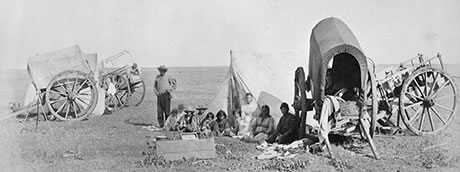 Castle Butte, Big Mud Valley, Saskatchewan, © iStockPhoto 482078249
Castle Butte, Big Mud Valley, Saskatchewan, © iStockPhoto 482078249
Land, Family and Identity: Contextualizing Metis health and well-being is authored by Metis scholar and historian, Dr. Brenda MacDougall. Her piece weaves together a timeline of Metis in Canada - a distinct peoples and culture - who emerged through intermarriages between “French, Scottish, and English traders with primarily, although not exclusively, Cree, Dene, Saulteaux and/or Anishinaabe, and Assiniboine women” (p.9). Through this exploration, Dr. MacDougall highlights how Metis kinship (wahkootowin) and Metis culture, sovereignty and governance are critical to identity and to health and well-being.
Métis are one of the three constitutionally recognized Aboriginal peoples in Canada. Despite this recognition, they have been largely left out of the fiduciary responsibilities and legal rights afforded to First Nations and Inuit in Canada. As well, their Indigenous identity and nationhood have often been challenged, if not outright forgotten, within the Canadian context. Yet Metis have similar colonial experiences as First Nations and Inuit. They were, and continue to be, influenced by colonial policies, laws and practices including: dispossession from homelands; social, political and economic marginalization and disadvantage; and the removal of children through residential schools and child welfare services. Metis peoples’ experiences of intergenerational and historic trauma have resulted in poorer health and well-being compared to non-Indigenous people. Lack of consistent research, evidence and longitudinal studies on Metis-specific determinants of health and well-being persist.
 © Credit: Library and Archives Canada, ID: DAPDCAP90314,
© Credit: Library and Archives Canada, ID: DAPDCAP90314,
"Camp scene of Métis people with carts on the prairie, 1872-1873."
After an in-depth historical overview of Metis experiences, the paper turns to the emergence and resurgence of political leadership and the development of representative organizations which have pursued Metis-specific land claims, hunting and fishing rights, self-determination, education, economic, and health and wellness programs. Landmark rulings, such as the Powley decision (2003) and the Daniels decision (2016) show advances to Metis rights and according to MacDougall, “represent a new hope for their health, well-being, and cultural safety” (p.25).